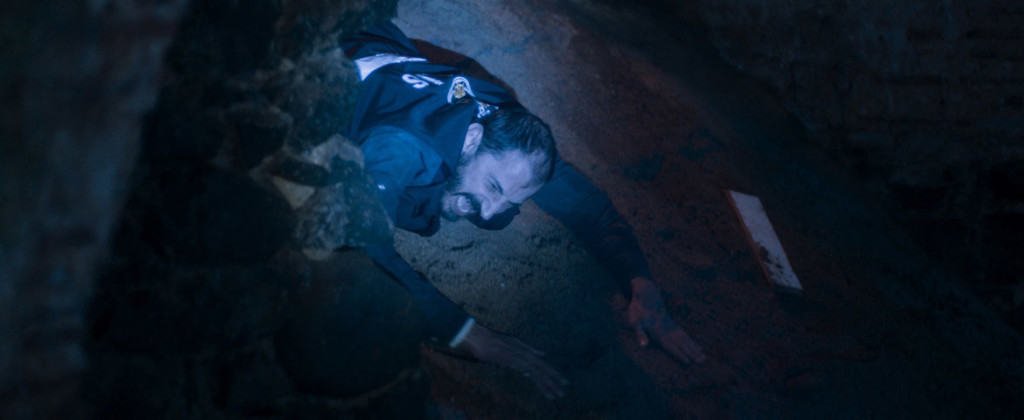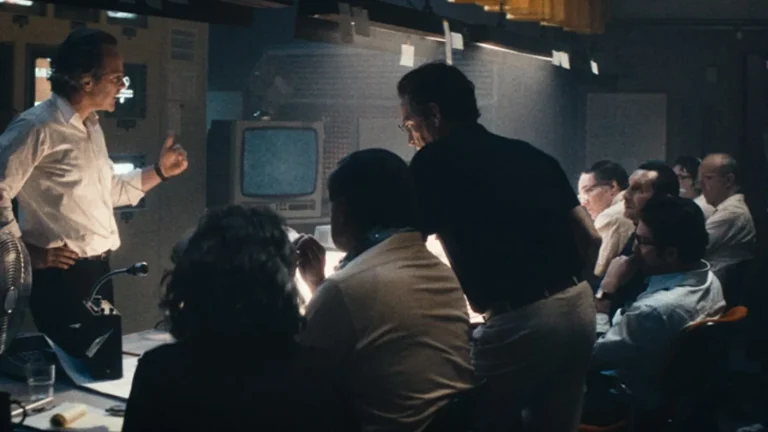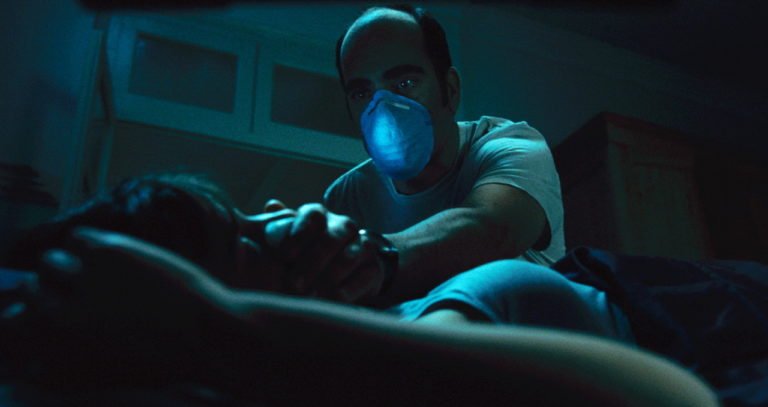2016 was host to the number of different sorts of horror films amongst their many different sub-genres, with the Turkish film Baskin, the directorial debut from Can Evrenol, amalgamating many of them with the torture porn sub-genre seemingly taking precedent. Baskin is an unashamed gorror film, delighting in its sadistic torture on display and its own brand of messed-up zaniness, though the film first builds up to all this through fun storytelling and effective horror tropes.
Evrenol does a great job with the different aspects of the terror. The build-up to the Hellish climax firstly begins at the isolated restaurant where a squad of police officers are caffeinating themselves as they await any calls. Amidst some cop banter, that inevitably turns brutal, a discussion between experienced cop Seyfi (Sabahattin Yakut) and rookie cop Arda (Gorkem Kasal) reveals the two have bizarre and elliptical illusions in common, with these hallucination sequences used as segues into other parts of the story in this nonlinear, twisty narrative. With this crazed unreliable narrator established, it seems anything horrific can happen as the film sets up its supernatural element through psychological trickery. It’s not til about nearly half-way through Baskin that the cops get their distress call to an abandoned and isolated mansion (where they will meet their doom), but everything so far has given the film an amiable sense of dread and distrust, with tensions heightened by the varying personalities and temperaments of the cops.
Just before arriving at the destination (set in what they claim is the derelict hot-spot of their city), they encounter a number of bizarre events that culminate with their van careening off the road. Making their way on foot towards the mansion, they end up encountering a destitute family with varying subtle mutations. Their slightly off-putting appearance, and moreso their estranged and enclosed lifestyle in the woods, amplifies even further the unease for the cops (and the film’s audience), but they make their way past them and finally come across the mansion, with an empty squad car just outside of it.
The way these scenes of the cops first exploring this mansion is shot in a classic horror way that is very effective, with the handheld camera positioned right next to them as they navigate their way through the darkened narrow corridors and around sharp corners, creating a strong chiaroscuro lighting scheme in the dark with their flashlights. Visually it evokes many horror films before it (even the ending of The Blair Witch Project), as does the distant sounds of the cries and groans that fill the mansion and geographically throw off both the cops and the audience. This creeping tension then soon leads to the discovery of one of the first on-site cops, who is shaken and disturbed beyond measure over what he has seen and experienced – another classic horror trope of a character reacting to (off-screen) terror to give an indication as to how much more disturbing the film is going to be.
And we do indeed see how disturbing it gets, as the squad continues searching through the mansion and what they discover is simultaneously horrifying, disgusting, confusing, and threatening. With the flashlight lighting causing a lot of cinematographic disorientation, it obscures, yet amplifies the terror that the cops find. Things only get worse from here when the remaining cops are taken down to the underground lair of the mansion, which is apparently Hell itself. It is at this point we are introduced to Baba (Mehmet Cerrahoglu), the Father of this underground hellhole of torture and subjugation, who has the most characteristic horror villain appearance since Pluto from The Hills Have Eyes. From this point on, the film isn’t so much scary, but murderous and gory in delightfully revealing ways that would make this torture porn sub-genre proud.
Baskin goes through many varying tried-and-tested tropes of the horror genre and manages to string them together in this simple story that is made all the more engaging and exciting through its interestingly written characters, bold direction, and occasionally surreal visual flair. It isn’t one of the more original or subversive horror films in recent years, nor is it so much a stirring or resonating kind of horror film, getting deep into the psychology and nuances the more ambitious titles of its genre explore. But it is audacious in how it splatters its influences together, taking cues from a variety of films, such as the villain and desolate setting from The Hills Have Eyes, the sadomasochistic delights from Hellraiser, the labyrinthine narrative set-up from Inception, and even some visual cues from Only God Forgives. Baskin isn’t really a cohesive piece and feels like an exercise in itself, but it is an exciting ride through the many surface-level thrills the horror genre can conjure, making it worth viewing for any horror fan keen to check out the many different paths this genre is taking these days.




![Hana-Bi [1997] Review – The Meditative Trip of a Beleaguered Detective](https://79468c92.delivery.rocketcdn.me/wp-content/uploads/2019/09/Hana-Bi-1997-768x432.jpg)

![The Return [2018]: ‘NYAFF’ Review](https://79468c92.delivery.rocketcdn.me/wp-content/uploads/2018/07/THE_RETURN_NYAFF_HOF-768x432.jpg)
